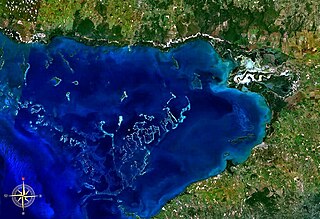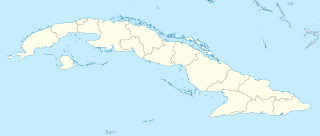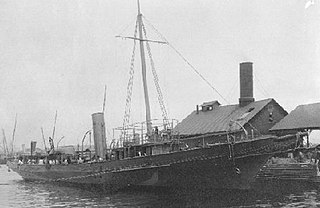
The Gulf of Guacanayabo is a bay along the southern coast of Cuba, bordered by Granma and Las Tunas provinces.

Julio Antonio Mella McPartland was a founder of the "internationalized" Cuban Communist Party. Mella studied law in the University of Havana until he was expelled in 1925 and is considered a hero by the present Cuban government. Some Cubans view him as a victim of the Stalin-Trotsky struggle. His biography varies with the source consulted.

Celia Sánchez Manduley was a Cuban revolutionary, politician, researcher and archivist. She was a close friend of Fidel Castro.

Bayamo is the capital city of the Granma Province of Cuba and one of the largest cities in the Oriente region.

Palma Soriano is a Cuban city and municipality in the Santiago de Cuba Province. With a population of 76,179 in the city proper, it is the 2nd in the province and the 16th in Cuba.

Yara is a small town and municipality in the Granma Province of Cuba, located halfway between the cities of Bayamo and Manzanillo, in the Gulf of Guacanayabo. Yara means "place" in the Taíno language.
The Catholic Church in Cuba is part of the worldwide Catholic Church, under the spiritual leadership of the Pope in Rome.
La Demajagua is the official Cuban newspaper of the provincial committee of the Cuban Communist Party in Granma Province. It is published in Spanish and English. It was named after the homonym sugar mill, near Manzanillo, in which Carlos Manuel de Céspedes issued his cry of independence, the "10th of October Manifesto", in 1868.
Fabio Grobart was born in Białystok, Poland August 30, 1905; his birth name was Abraham Grobart a.k.a. Abraham Simjovitch.

Sierra Maestra Airport is a regional airport that serves the town of Manzanillo in Cuba.

The First Battle of Manzanillo was a series of naval engagements during the Spanish–American War on 30 June 1898 in and outside of the harbor of Manzanillo, Cuba. Three American gunboats were forced to retire after attacking a squadron of Spanish gunboats and auxiliaries.
The People's Party was a short-lived political party in Cuba. It was founded on November 7, 1900 by Diego Vicente Tejera. The People's Party sought to mobilize the working class of Cuba into political action. However the party failed to make any significant political breakthrough. Tejera took part in the Constituent Convention of 1901 as a delegate from the People's Party.

Blas Roca Calderio was a Cuban politician and Marxist theorist who served as President of the National Assembly of People's Power in Cuba from 1976 to 1981. He was also head of the pre-1959 revolution Communist Party of Cuba for 28 years and editor of the communist newspaper Hoy. He was a signatory of the Cuban Constitution of 1940 and chaired the committee that wrote the country's first socialist constitution in 1976.

The Communist Party of Cuba is the ruling political party in the Republic of Cuba. It is a communist party of the Marxist–Leninist model. The Cuban constitution ascribes the role of the party to be the "leading force of society and of the state". Since April 2011, the First Secretary of the Central Committee has been Raúl Castro, younger brother of the previous First Secretary Fidel Castro, who died on 25 November 2016. The Second Secretary has been José Ramón Machado Ventura.

Bartolomé de Jesús Masó Márquez was a Cuban politician and military, patriot for Cuban independence from the colonial power of Spain, and later President of the República en Armas.

The Circuito Sur de Oriente (CSO), meaning "Southern Circuit of the Orient", is a west-east highway connecting Bayamo to Santiago de Cuba, through Manzanillo, Niquero and the southern coastal side of eastern Cuba, below the Sierra Maestra mountain range. Also known as Circuito Guacanayabo-Sur de Oriente, because it crosses the Gulf of Guacanayabo, the name Oriente, refers to the ancient and former Oriente Province. With a length of 347 km, it is the fourth-longest Cuban highway after the "Carretera Central", the "Circuito Norte" and the "Circuito Sur".













